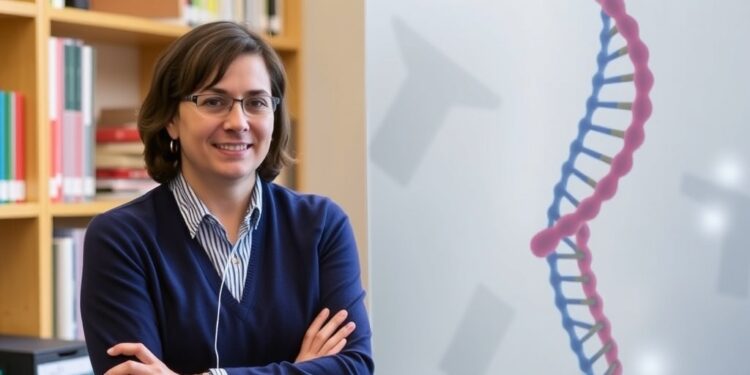In a thought-provoking opinion piece set to be published in the esteemed journal Trends in Genetics, Professor Mark Peifer from the University of North Carolina at Chapel Hill is making a striking argument for the inclusion of eugenics in the educational framework of college genetics courses. As the world grapples with the complex intersections between science, ethics, and politics, Peifer insists that an understanding of eugenics is not merely an academic exercise but a crucial aspect of preparing future scientists for the societal implications of their work.
Eugenics, a term first coined in 1883, refers to a set of beliefs and practices that promote the idea of improving the genetic quality of a population, often through selective breeding. This contentious ideology gained traction throughout the 20th century, becoming inextricably linked to atrocities such as forced sterilizations, discriminatory immigration policies, and some of the most horrific genocides in history, particularly during the Holocaust under Nazi Germany. Peifer emphasizes that eugenics is not merely a relic of the past; rather, it continues to reverberate in modern scientific and political conversations, evidenced by the language used in contemporary discussions about genetics and heredity.
In the classroom, Peifer’s innovative approach led students through a detailed exploration of the eugenics movement’s history, illuminating the ethical dilemmas that arise at the intersection of genetics and societal governance. With voices justifying forced sterilization and racial segregation firmly seated in the past, Peifer cautions that these ideas can resurface, often couched in more palatable contemporary terms. He points out that political candidates frequently employ rhetoric surrounding “good genes” and “bad genes,” echoing eugenic sentiments when discussing immigration and national purity. Such terminology invites a careful examination of how scientific concepts are manipulated for political ends.
By urging educators to include discussions of eugenics in genetics curricula, Peifer advocates for a more conscientious approach to science education. He believes that teaching about eugenics is essential for undergraduate students to critically assess the responsibilities they will bear as future scientists. The goal is not just to arm students with knowledge but to instill a sense of ethical obligation in confronting scientific misinformation and its potentially harmful applications in society.
Delving deeper into the relevance of eugenics today, Peifer brings forward complex and contentious topics like in vitro fertilization (IVF) and genetic screening. These conversations compel students to confront ethical scenarios that involve screening for genetic disorders, selecting embryos based on sex, and other potential gene-editing technologies. Each question is laden with implications, challenging students to think about where the line should be drawn in the name of human advancement and how such decisions reflect broader societal values about diversity and human worth.
Peifer’s insistence on including eugenics in the curriculum highlights the interdisciplinary nature of genetics and societal impact. Understanding the historical misuse of genetic principles helps prepare students for real-world situations where they may witness or encounter scientific manipulation for political gain. In doing so, Peifer bridges a critical gap between scientific education and civic responsibility, underscoring the idea that scientists cannot afford to remain silent when science is weaponized in the pursuit of power.
As he articulates in his paper, “Science provides technology, but society decides how to use it.” This observation serves as a reminder that scientific advancements don’t exist in a vacuum. Rather, they flourish in a societal context that is influenced by historical narratives, current ideologies, and ethical considerations. Imparting this wisdom upon students creates future generations of scientists who are not only experts in their fields but are also equipped with the critical thinking necessary to navigate the murky waters of scientific ethics and public discourse.
In light of the troubling history of eugenics, Peifer highlights the importance of vigilance in the scientific community to ensure such ideologies do not find renewed legitimacy in modern scientific advancements. He posits that the legacy of eugenics is a cautionary tale, relevant in today’s debates regarding gene editing, reproductive rights, and genetic privacy. By incorporating eugenics into genetics education, future scientists can recognize patterns that may repeat if history is ignored, allowing for proactive measures to be put in place.
As society continues to evolve and grapple with the implications of genetic technologies, educators like Peifer set a precedent for a more robust ethical framework within which science can be practiced. By fostering open dialogue regarding the dark aspects of scientific history, educators can empower students to not only discern the complexities of genetic science but also actively engage in conversations about its moral ramifications.
In a world increasingly dominated by discussions about genomics, the need for a grounded understanding of the past becomes ever more urgent. By reexamining old ideologies through the lens of modern science and political dynamics, Peifer’s arguments serve as a critical call to action for educators to integrate historical context into scientific curricula. In doing so, the next generation of scientists may emerge better prepared to confront ethical dilemmas and advocate for the responsible use of scientific advancements.
In closing, Peifer challenges not just educators but also the entire scientific community to reflect on their roles as stewards of knowledge and to prioritize ethical considerations in their endeavors. As science continues to shape public policy and social norms, the inclusion of eugenics in genetics curricula will empower students to navigate the challenges ahead—a reflection of a collective responsibility to ensure that the lessons of history inform the promise of future scientific progress.
Subject of Research: Not applicable
Article Title: We must not ignore eugenics in our genetics curriculum
News Publication Date: 27-Mar-2025
Web References: Trends in Genetics
References: N/A
Image Credits: N/A
Keywords: Eugenics, Genetic Curriculum, Science Education, Ethical Implications, Molecular Genetics, Genetics History, Civic Responsibility




